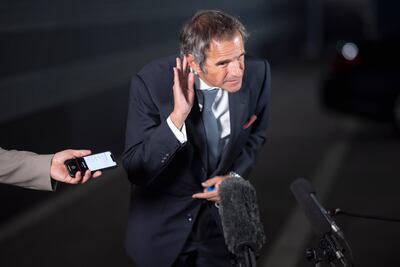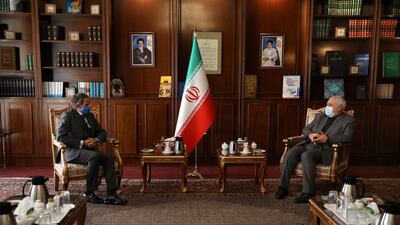Iran’s belated decision this week to allow inspectors from the United Nations’ atomic watchdog access to two suspected nuclear sites needs to be seen against the background of Iran’s diplomatic offensive to have the international arms embargo lifted.
Iran and the UN-sponsored International Atomic Energy Agency (IAEA) have been at loggerheads for several months over complaints by nuclear inspectors that Iran has been denying them access to two sites at Marizan and Amad that they suspect are linked to the country’s controversial nuclear programme. UN inspectors believe that the sites have been used for developing and storing nuclear material related to the country’s clandestine nuclear weapons programme, which the CIA believes was active until 2003.
Nuclear experts at the IAEA believe the sites were active in the early 2000s, but Tehran has consistently refused to allow UN inspectors access to the sites despite signing the controversial 2015 nuclear deal with the world’s major powers.
The stand-off between Tehran and the IAEA over the sites, together with disputes over other unresolved issues, prompted the organisation to take the unprecedented step of publishing a special report in March about the unanswered questions that remained about Iran’s nuclear activities, and the lack of co-operation inspectors had received from Tehran.
This was followed in June when the IAEA’s Board of Governors, led by the US and the European signatories to the deal, Britain, France and Germany, issued a rare condemnation of Iran for stonewalling its nuclear inspectors and called on the country to allow the agency access to two undeclared sites. The resolution was the first time the organisation had formally criticised the Islamic Republic since 2012.
Since then a senior team of IAEA officials have been involved in talks with Dr Ali Akbar Salehi, the head of the Atomic Energy Agency of Iran, to resolve the dispute. A breakthrough was made earlier this month when Tehran signalled it would end its opposition to the inspectors visiting the disputed sites.
This led to IAEA Director General Rafael Grossi travelling to Tehran earlier this week for meetings with key Iranian officials, including Foreign Minister Mohammad Javad Zarif and Dr Salehi.
In a joint statement issued after the meetings on Wednesday, the IAEA and Iran announced that they had reached an agreement on dates for access and verification activities “after intensive bilateral consultations.”
There will, of course, be a degree of scepticism over whether Iran will actually comply with the terms of the agreement signed by Mr Grossi and Dr Salehi, or indulge in the prevarication tactics that have characterised Iran’s dealings with the IAEA over more than two decades.
Iran's priority is to get the arms embargo lifted
Indeed, the imposition of an arms embargo against Tehran was first undertaken in 2007 after the Iranian regime was accused of failing to co-operate fully with the IAEA over its nuclear programme.
But while a number of serious questions still remain about Iran’s nuclear activities, such as the activities carried out at undeclared nuclear sites and the exact size of the stockpiles of nuclear material Iran has developed since signing the 2015 deal, Iran’s main priority now is to get UN arms embargo lifted when it comes up for renewal in October.
And on that front, all the indications are that Tehran may well achieve its goal.
Iran, backed by China and Russia, insists that the arms embargo that was imposed under a number of UN Security Council resolutions is no longer valid because of the Trump administration’s unilateral decision to withdraw from the nuclear deal in 2018.
Washington insists this is not the case, and that the nuclear deal is separate from the arms embargo issue. But attempts by US Secretary of State Mike Pompeo to persuade European leaders to support Washington’s position have so far met with little success, prompting Mr Pompeo to accuse Washington’s European allies of “siding with the ayatollahs.”
For this reason Tehran is now trying to demonstrate its willingness to co-operate with the UN by resolving the dispute over allowing inspectors access to disputed nuclear sites.”
As one Western diplomat with knowledge of the negotiations told me: “Iran’s priority is to get the arms embargo lifted, which the Iranian government believes would be a major diplomatic coup against the US. This explains Tehran’s decision to end its differences with the IAEA.
“The big question is whether Tehran will abide by its undertakings to allow new inspections or continue to frustrate IAEA inspectors?”
Certainly, the deal between the IAEA and Tehran, which is due to be discussed at a meeting of the nuclear deal’s signatories in Vienna on Tuesday, is unlikely to make much impact on the Trump administration’s hostile attitude towards Iran.
On the contrary, Mr Pompeo has made it clear that even without the support of America’s allies in Europe, Washington will continue to press for the continuation of the arms embargo, irrespective of whether the nuclear deal continues or not.
To this end Mr Pompeo travelled to the UN earlier this month in an attempt to persuade the body to maintain the sanctions by filing a formal complaint accusing Iran of breaching its obligations.
But earlier this week the US initiative was rejected by the UN Security Council after the body, which is currently chaired by Indonesia, declared that it was "not in a position to take further action" on Washington's request, citing a lack of consensus in the 15-member body. Among those who opposed the US move were Britain, France and Germany.
The UN’s decision now leaves the US isolated, a situation that raises the terrifying prospect of the arms embargo being lifted, thereby allowing Iran the freedom to buy arms on the open market.
Con Coughlin is a defence and foreign affairs columnist for The National
The specs
Engine: 0.8-litre four cylinder
Power: 70bhp
Torque: 66Nm
Transmission: four-speed manual
Price: $1,075 new in 1967, now valued at $40,000
On sale: Models from 1966 to 1970
If%20you%20go
%3Cp%3EThere%20are%20regular%20flights%20from%20Dubai%20to%20Kathmandu.%20Fares%20with%20Air%20Arabia%20and%20flydubai%20start%20at%20Dh1%2C265.%3Cbr%3EIn%20Kathmandu%2C%20rooms%20at%20the%20Oasis%20Kathmandu%20Hotel%20start%20at%20Dh195%20and%20Dh120%20at%20Hotel%20Ganesh%20Himal.%3Cbr%3EThird%20Rock%20Adventures%20offers%20professionally%20run%20group%20and%20individual%20treks%20and%20tours%20using%20highly%20experienced%20guides%20throughout%20Nepal%2C%20Bhutan%20and%20other%20parts%20of%20the%20Himalayas.%3C%2Fp%3E%0A
UAE currency: the story behind the money in your pockets
Mercer, the investment consulting arm of US services company Marsh & McLennan, expects its wealth division to at least double its assets under management (AUM) in the Middle East as wealth in the region continues to grow despite economic headwinds, a company official said.
Mercer Wealth, which globally has $160 billion in AUM, plans to boost its AUM in the region to $2-$3bn in the next 2-3 years from the present $1bn, said Yasir AbuShaban, a Dubai-based principal with Mercer Wealth.
“Within the next two to three years, we are looking at reaching $2 to $3 billion as a conservative estimate and we do see an opportunity to do so,” said Mr AbuShaban.
Mercer does not directly make investments, but allocates clients’ money they have discretion to, to professional asset managers. They also provide advice to clients.
“We have buying power. We can negotiate on their (client’s) behalf with asset managers to provide them lower fees than they otherwise would have to get on their own,” he added.
Mercer Wealth’s clients include sovereign wealth funds, family offices, and insurance companies among others.
From its office in Dubai, Mercer also looks after Africa, India and Turkey, where they also see opportunity for growth.
Wealth creation in Middle East and Africa (MEA) grew 8.5 per cent to $8.1 trillion last year from $7.5tn in 2015, higher than last year’s global average of 6 per cent and the second-highest growth in a region after Asia-Pacific which grew 9.9 per cent, according to consultancy Boston Consulting Group (BCG). In the region, where wealth grew just 1.9 per cent in 2015 compared with 2014, a pickup in oil prices has helped in wealth generation.
BCG is forecasting MEA wealth will rise to $12tn by 2021, growing at an annual average of 8 per cent.
Drivers of wealth generation in the region will be split evenly between new wealth creation and growth of performance of existing assets, according to BCG.
Another general trend in the region is clients’ looking for a comprehensive approach to investing, according to Mr AbuShaban.
“Institutional investors or some of the families are seeing a slowdown in the available capital they have to invest and in that sense they are looking at optimizing the way they manage their portfolios and making sure they are not investing haphazardly and different parts of their investment are working together,” said Mr AbuShaban.
Some clients also have a higher appetite for risk, given the low interest-rate environment that does not provide enough yield for some institutional investors. These clients are keen to invest in illiquid assets, such as private equity and infrastructure.
“What we have seen is a desire for higher returns in what has been a low-return environment specifically in various fixed income or bonds,” he said.
“In this environment, we have seen a de facto increase in the risk that clients are taking in things like illiquid investments, private equity investments, infrastructure and private debt, those kind of investments were higher illiquidity results in incrementally higher returns.”
The Abu Dhabi Investment Authority, one of the largest sovereign wealth funds, said in its 2016 report that has gradually increased its exposure in direct private equity and private credit transactions, mainly in Asian markets and especially in China and India. The authority’s private equity department focused on structured equities owing to “their defensive characteristics.”
Mountain%20Boy
%3Cp%3E%3Cstrong%3EDirector%3A%3C%2Fstrong%3E%20Zainab%20Shaheen%3C%2Fp%3E%0A%3Cp%3E%3Cstrong%3EStarring%3A%3C%2Fstrong%3E%20Naser%20Al%20Messabi%3C%2Fp%3E%0A%3Cp%3E%3Cstrong%3ERating%3C%2Fstrong%3E%3A%203%2F5%3C%2Fp%3E%0A
Company%20Profile
%3Cp%3E%3Cstrong%3ECompany%3A%3C%2Fstrong%3E%20Astra%20Tech%3Cbr%3E%3Cstrong%3EStarted%3A%20%3C%2Fstrong%3EMarch%202022%3Cbr%3E%3Cstrong%3EBased%3A%20%3C%2Fstrong%3EDubai%3Cbr%3E%3Cstrong%3EFounder%3A%20%3C%2Fstrong%3EAbdallah%20Abu%20Sheikh%3Cbr%3E%3Cstrong%3EIndustry%3A%3C%2Fstrong%3E%20technology%20investment%20and%20development%3Cbr%3E%3Cstrong%3EFunding%20size%3A%3C%2Fstrong%3E%20%24500m%3C%2Fp%3E%0A
The specs: 2019 Mercedes-Benz C200 Coupe
Price, base: Dh201,153
Engine: 2.0-litre turbocharged four-cylinder
Transmission: Nine-speed automatic
Power: 204hp @ 5,800rpm
Torque: 300Nm @ 1,600rpm
Fuel economy, combined: 6.7L / 100km
UAE currency: the story behind the money in your pockets
Living in...
This article is part of a guide on where to live in the UAE. Our reporters will profile some of the country’s most desirable districts, provide an estimate of rental prices and introduce you to some of the residents who call each area home.
The specs
Engine: 3.9-litre twin-turbo V8
Transmission: seven-speed
Power: 720hp
Torque: 770Nm
Price: Dh1,100,000
On sale: now
The%20specs%20
%3Cp%3E%3Cstrong%3EEngine%3A%20%3C%2Fstrong%3E2.0-litre%204cyl%20turbo%0D%3Cbr%3E%3Cstrong%3EPower%3A%20%3C%2Fstrong%3E261hp%20at%205%2C500rpm%0D%3Cbr%3E%3Cstrong%3ETorque%3A%20%3C%2Fstrong%3E400Nm%20at%201%2C750-4%2C000rpm%0D%3Cbr%3E%3Cstrong%3ETransmission%3A%20%3C%2Fstrong%3E7-speed%20dual-clutch%20auto%0D%3Cbr%3E%3Cstrong%3EFuel%20consumption%3A%20%3C%2Fstrong%3E10.5L%2F100km%0D%3Cbr%3E%3Cstrong%3EOn%20sale%3A%20%3C%2Fstrong%3ENow%0D%3Cbr%3E%3Cstrong%3EPrice%3A%20%3C%2Fstrong%3EFrom%20Dh129%2C999%20(VX%20Luxury)%3B%20from%20Dh149%2C999%20(VX%20Black%20Gold)%3C%2Fp%3E%0A
Who's who in Yemen conflict
Houthis: Iran-backed rebels who occupy Sanaa and run unrecognised government
Yemeni government: Exiled government in Aden led by eight-member Presidential Leadership Council
Southern Transitional Council: Faction in Yemeni government that seeks autonomy for the south
Habrish 'rebels': Tribal-backed forces feuding with STC over control of oil in government territory
The specs
Engine: 4.0-litre V8 twin-turbocharged and three electric motors
Power: Combined output 920hp
Torque: 730Nm at 4,000-7,000rpm
Transmission: 8-speed dual-clutch automatic
Fuel consumption: 11.2L/100km
On sale: Now, deliveries expected later in 2025
Price: expected to start at Dh1,432,000
The specs
- Engine: 3.9-litre twin-turbo V8
- Power: 640hp
- Torque: 760nm
- On sale: 2026
- Price: Not announced yet



